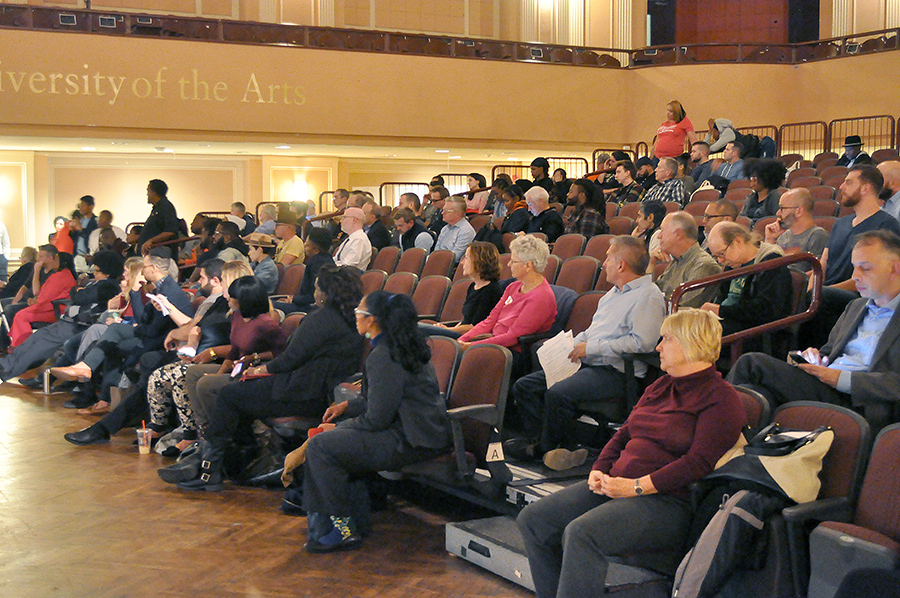Almost 100 people gathered Thursday at the Gershman Y to discuss race relations in the city’s LGBT community.
The Office of LGBT Affairs and PCHR hosted a Community Conversation to address developments over the past year since PCHR’s initial hearing on Gayborhood racism. Held on Oct. 25, 2016, the event included 28 speakers and brought an estimated 375 attendees. PCHR convened the hearing after a series of allegations regarding racist dress codes and hiring practices at LGBT bars — an issue that erupted after a video was leaked of ICandy owner Darryl DePiano using the n-word.
“What happened that night [of the hearing] was really some trauma-processing,” Director of LGBT Affairs Amber Hikes said this week about the initial hearing. “I say that because we are going to be building on the energy that was created in that space a year ago but the energy here will be distinct. This past year has been about uncovering the problems, unearthing the problems. Tonight is about identifying solutions and finding cures.”
Progress made
PCHR Executive Director Rue Landau and Hikes addressed the progress their offices made in the past year.
Councilman Derek S. Green introduced a bill in November in response to the PCHR hearing and after reading news accounts and stories from people of color within the LGBT community. The bill, which Mayor Jim Kenney signed in June, amends the Fair Practices Ordinance by giving PCHR authority to issue cease-and-desist orders to businesses violating the nondiscrimination ordinance.
Additionally, the Office of LGBT Affairs collaborated with local advertising agency Tierney to introduce a new rainbow flag featuring black and brown stripes. The new flag expanded on Gilbert Baker’s original six-color design to symbolize the LGBT community’s racial diversity.
Earlier this year, PCHR also released its findings in “Inform, Monitor, Enforce: Addressing Racism and Discrimination in Philadelphia’s LGBTQ Community.” This particular initiative sparked several questions from event attendees.
The findings concluded that LGBT people “often feel unwelcome and unsafe in Gayborhood spaces” and that businesses and bars have discriminatory practices. PCHR then recommended training on the Fair Practices Ordinance for bar owners and staff.
“Through our process of the trainings that we did with [the bar owners], many of them have said that they would be willing to sit down at a community conversation to say, ‘How are we doing?’” Landau said after an audience member asked about the bar staff’s compliance with the trainings.
Landau also noted informal evaluations from bar staff.
“For some of the bar staff, there were different reactions from people of color than the white staff,” she said. “The people of color were nodding their heads, very happy afterward, and saying, ‘Thank you so much for bringing these things up.’ [There were also] varying reactions from some of the white staff — some of whom were very appreciative and said, ‘Thank you’ and others who were not as appreciative.”
The research findings also recommended training for Mazzoni Center and Philadelphia FIGHT. An audience member asked why PCHR required those two specific organizations to undergo training.
“We had two formal complaints filed against one of them and we also were hearing a lot of informal complaints about another one,” Landau said. “We opened it up to other nonprofits if they wanted to do it but we weren’t hearing specific complaints about them at the time.”
Upcoming initiatives and reactions from bar owners
Toward the end of the community conversation, attendees broke out into small groups to discuss ways in which the community can move forward. Representatives from the Office of LGBT Affairs compiled information from these groups for future review.
Hikes also noted an upcoming partnership with the Independence Business Alliance and William Way LGBT Community Center to develop a “leadership pipeline” to address the lack of representation on boards and organizations. She said the Office of LGBT Affairs hopes to launch the initiative in the spring.
“What we will be doing as a community is providing opportunities for historically marginalized groups — people of color, trans folks, youth and elders — and making sure that they have the skills and resources they need to serve on these boards, serve in upper-level management and actually have a voice and a seat at the table in a way that they haven’t before,” Hikes said.
Twelve bars — The Bike Stop, Boxers, Franky Bradley’s, ICandy, Knock, Stir Lounge, Tabu Lounge & Bar, Tavern on Camac, Toasted Walnut, U Bar, Voyeur and Woody’s — have undergone PCHR training. Two owners were in attendance at the Community Conversation.
Bill Wood, owner of Knock, lives in Florida but comes to Philadelphia once a month and said he made sure to coordinate his trip during the Community Conversation.
“People were talking tonight,” Wood told PGN. “They weren’t hollering at each other. There weren’t a lot of fingers being pointed and most people, I think, are looking for solutions on how to make things better.”
Jeffrey Sotland, owner of Tabu, told PGN that his staff is instilled with a “pattern of conduct” to treat everyone who walks through the door as a “friend” rather than a “customer.” He also said the bar has included more diverse programming both for and by trans people and people of color.
“I wanted to hear what the feedback was from a year later but more importantly, I wanted to hear how people feel now,” Sotland said. “I know how I feel but I don’t matter. My customers, the community, everyone around me — they matter. I have a space that I want to make as welcoming as possible to everybody in this community, not just a certain demographic.”

